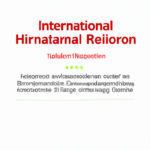International relations is a multifaceted and dynamic field that encompasses the complex interactions and collaborations between nations on a global scale. It involves the study and analysis of various aspects such as diplomacy, trade, warfare, and cultural exchange across borders. This discipline explores how countries interact with each other, negotiate and resolve conflicts, and cooperate on various issues, ranging from economic development to environmental protection. International relations play a crucial role in shaping the global order and influencing the policies and actions of nations. Understanding and navigating the complexities of international relations is essential for promoting peace, fostering cooperation, and addressing global challenges effectively.
International relations refers to the interactions and relationships between nations and states in the global arena. It encompasses various aspects such as diplomacy, politics, economics, security, and culture. The study of international relations aims to understand and analyze the dynamic interactions between different countries and their impact on the global community.
One of the key elements of international relations is diplomacy, which involves negotiations and dialogue between countries to resolve conflicts and pursue common interests. Diplomatic relations are established through bilateral or multilateral treaties and agreements, allowing nations to work together on issues of mutual concern, such as trade, security, and human rights.
Economic relations play a vital role in international relations, with globalization and technological advancements facilitating increased trade and interdependence between nations. International organizations like the World Trade Organization (WTO) help regulate and promote global trade, ensuring fairness and a level playing field for all countries.
Security is another central aspect of international relations, as nations strive to protect their sovereignty and ensure the safety of their citizens. Collaboration among countries in areas like counterterrorism, nuclear non-proliferation, and peacekeeping operations helps maintain global stability and peace.
Furthermore, cultural exchanges and interactions contribute to the development of international relations, fostering understanding and mutual respect among different nations. Educational and cultural exchange programs promote people-to-people connections, which in turn build bridges between nations and create a sense of shared humanity.
International relations are constantly evolving, influenced by a complex combination of political, economic, and social factors. The rise of regional blocs, the influence of non-state actors like multinational corporations and non-governmental organizations, and the impact of emerging powers are all contributing to the changing dynamics of international relations in the 21st century.
In conclusion, international relations encompass a wide range of interconnected issues and factors that shape the relationships between nations. Understanding and analyzing these dynamics is crucial for addressing global challenges, promoting cooperation, and building a more peaceful and prosperous world.
Globalization and its impact on international relations
Globalization refers to the increasing interconnectedness and integration of countries and societies through various economic, political, and cultural exchanges. It has had a significant impact on international relations, transforming the way countries interact and shaping the dynamics of global governance.
Economically, globalization has led to the proliferation of multinational corporations and the expansion of international trade. As barriers to trade and investment have been reduced, countries have become more interdependent, relying on each other for goods, services, and resources. This economic interdependence has fostered cooperation and collaboration among nations, as well as fueled competition and negotiations over trade agreements and economic policies.
Moreover, globalization has altered the balance of power in international relations. The emergence of new economic powerhouses, such as China and India, has challenged the traditional dominance of Western countries. This shift in power dynamics has prompted a reevaluation of global governance structures and institutions, as well as a recalibration of geopolitical strategies.
Politically, globalization has facilitated the spread of democratic values and norms. Through increased communication and information exchange, people have become more aware of the importance of democracy, human rights, and freedom of expression. Consequently, governments are under greater scrutiny from the international community, and violations of these principles can lead to diplomatic and economic repercussions.
However, globalization has also given rise to challenges and tensions in international relations. The intensification of global interconnectedness has made countries more vulnerable to economic shocks and financial crises. The 2008 global financial crisis, for example, demonstrated the interconnectedness of national economies and the potential for economic contagion.
Globalization has also exacerbated inequalities and disparities among nations. While some countries have greatly benefited from the expansion of global markets and the influx of foreign direct investment, others have been left behind, leading to increased economic disparities and socio-political unrest. This has prompted calls for a more inclusive and equitable form of globalization that addresses these imbalances.
Culturally, globalization has led to the spread of ideas, beliefs, values, and cultural practices across borders. This cultural exchange has both positive and negative implications. On the one hand, it has promoted cultural diversity and understanding, fostering cross-cultural dialogue and appreciation. On the other hand, it has also spurred concerns about the erosion of traditional cultural identities and the dominance of Western cultural values.
In conclusion, globalization has had a profound impact on international relations. It has reshaped economic systems, political power structures, and cultural dynamics. While it has brought about numerous benefits, such as increased economic interdependence and the spread of democratic values, globalization has also brought challenges and tensions that require careful navigation and a proactive approach to global governance.
Diplomacy and negotiation in international relations
Diplomacy and negotiation play significant roles in international relations, serving as instrumental tools for resolving conflicts, managing relations between nations, and promoting cooperation on various global issues. These two aspects are closely intertwined, as diplomacy often involves negotiation processes to reach agreements that benefit all parties involved.
Diplomacy encompasses the art of conducting negotiations and maintaining relationships between governments and other international actors, such as international organizations and non-governmental entities. The primary purpose of diplomacy is to represent national interests, promote peace, and achieve mutually beneficial outcomes through dialogue and understanding. It is a nonviolent approach to conflict resolution, aiming to prevent armed conflicts and foster cooperation.
Negotiation, on the other hand, is the process through which parties involved in a dispute or issue engage in discussions and make compromises to find common ground or reach a settlement. Negotiations can take place at different levels, ranging from bilateral talks between two countries to multilateral discussions involving numerous nations and international organizations.
The principles of diplomacy and negotiation are built upon the concepts of mutual respect, trust, and compromise. At the heart of successful diplomacy and negotiation lies the recognition of the diversity of interests and perspectives among nations and the willingness to find common solutions despite different viewpoints. This requires skilled diplomats and negotiators who possess effective communication, analytical, and problem-solving skills.
In the realm of international relations, diplomacy and negotiation are utilized to address a wide array of issues, including territorial disputes, trade negotiations, arms control, environmental concerns, and humanitarian crises, among others. For instance, diplomatic efforts can be seen in diplomatic missions, embassies, and international summits, such as the United Nations General Assembly or the G7 meetings, where leaders engage in constructive dialogues to discuss and resolve global challenges.
Moreover, diplomacy and negotiation provide essential platforms for building relationships and fostering trust between nations. Through diplomatic engagements, states can understand each other’s perspectives better, identify areas of cooperation, and find common ground to work towards shared goals. This contributes to maintaining stability, facilitating economic development, and promoting peaceful coexistence in the international system.
However, diplomacy and negotiation are not without their challenges. Complex geopolitical issues, conflicting interests, power struggles, and historical disputes can hinder the progress of diplomatic efforts. Patience, perseverance, and creativity are often required to navigate through these obstacles and find meaningful solutions.
In conclusion, diplomacy and negotiation are indispensable tools in international relations. They provide avenues for dialogue, compromise, and understanding, helping to prevent conflicts, promote cooperation, and achieve mutually beneficial outcomes. As the world becomes increasingly interconnected, the importance of skilled diplomats and negotiators in managing global affairs becomes ever more significant.
Power dynamics and international regimes
Power dynamics and international regimes refer to the interactions and relationships between countries in the global arena, particularly in terms of power distribution and the establishment of international systems and frameworks. These concepts play a crucial role in understanding how countries navigate and negotiate their interests within the international community.
Power dynamics in international relations revolve around the shifting balance of power among states. The distribution of power can be classified into various categories, such as unipolar, bipolar, and multipolar systems. In a unipolar system, one dominant state holds the majority of power, while in a bipolar system, power is mainly concentrated between two superpowers. In a multipolar system, power is fragmented among several major states. These dynamics influence the behavior of states, as they strive to maintain or increase their share of power.
International regimes, on the other hand, refer to the set of rules, norms, and institutions that govern the behavior of states in specific issue areas. Regimes are formed to address common challenges and provide a framework for cooperation and coordination among states. Examples of international regimes include trade agreements, human rights conventions, and environmental treaties. These regimes can help foster stability and provide a basis for predictability and collaboration in international affairs.
Power dynamics and international regimes are closely intertwined. States with greater power often have the ability to shape international regimes to better serve their interests. They can influence the agenda-setting process, negotiate favorable terms, and ensure compliance with agreed rules and norms. However, the dynamics of power can also lead to contestation and conflict among states, which may hinder the effectiveness and legitimacy of international regimes.
Developing countries often face challenges in power dynamics and international regimes. They may have limited influence in shaping global governance structures and are more susceptible to the policies and decisions of more powerful states. As a result, they may seek to form alliances or regional blocs to amplify their influence and overcome power asymmetries.
Overall, power dynamics and international regimes are central to understanding the functioning of the global order. They shape the behavior of states and provide a framework for cooperation and conflict resolution in international relations. Acknowledging the complex interplay between power and regimes is essential for analyzing and addressing contemporary global challenges.
Conflict resolution and peacekeeping in international relations
Conflict resolution and peacekeeping are integral aspects of international relations. In an ever-globalizing world, it has become increasingly important to effectively manage and resolve conflicts between nations and ensure the maintenance of peace. This article delves into the significance of conflict resolution and peacekeeping in international relations and explores various strategies and organizations involved in these endeavors.
Conflict resolution refers to the methods and processes used to handle disagreements, disputes, and conflicts between nations or other actors within the international arena. It comprises various diplomatic efforts aimed at finding peaceful and mutually acceptable solutions to conflicts. These efforts often involve negotiation, mediation, and arbitration, with the ultimate goal of fostering understanding, cooperation, and peaceful coexistence.
Peacekeeping, on the other hand, refers to the deployment of international forces, typically under the United Nations (UN) umbrella, to regions affected by conflict. The primary objective of peacekeeping missions is to implement ceasefires, monitor compliance with peace agreements, and facilitate the transition from conflict to stability and development. Peacekeepers act as neutral intermediaries, working towards establishing and maintaining peaceful conditions for the parties involved.
The role of conflict resolution and peacekeeping in international relations cannot be overstated. By resolving conflicts and promoting peace, nations can prevent the eruption of violent conflicts, protect human rights, and foster social and economic development. Furthermore, these endeavors contribute to fostering a culture of diplomacy and cooperation, strengthening international institutions, and promoting adherence to international law.
The United Nations plays a central role in conflict resolution and peacekeeping efforts. It provides a platform for negotiation and dialogue among nations and deploys peacekeeping missions in areas affected by conflict. The UN Security Council, composed of member states, has the primary responsibility for maintaining international peace and security and authorizing the deployment of peacekeeping forces.
Regional organizations also play a significant role in conflict resolution and peacekeeping. Organizations such as the African Union, the European Union, and the Organization of American States have established mechanisms to address conflicts within their respective regions. These organizations often collaborate with the United Nations in peacekeeping efforts, presenting a comprehensive and collective approach to resolving conflicts.
Conflict resolution and peacekeeping may involve a combination of diplomatic, political, and military approaches. Diplomatic efforts focus on dialogue, negotiations, and the prevention of conflicts through early warning systems and preventive diplomacy. Political approaches involve facilitating peace processes, supporting democratic transitions, and promoting human rights and the rule of law. Military involvement, through peacekeeping forces, aims to create stability and provide security during or after conflicts.
In conclusion, conflict resolution and peacekeeping are essential components of international relations. By effectively managing conflicts and promoting peaceful solutions, nations can safeguard global peace, stability, and development. The United Nations, regional organizations, diplomacy, and multilateral efforts all play crucial roles in addressing conflicts, fostering peace, and building a more harmonious world.
Economic interdependence and trade relations in international relations
Economic interdependence and trade relations play a vital role in the field of international relations. These two concepts are interconnected, as they involve the exchange of goods, services, and capital between countries, resulting in various impacts on the global economy.
Firstly, economic interdependence refers to the mutual dependence of countries on one another for economic resources and opportunities. In today’s globalized world, countries rely heavily on each other for trade, investment, and cooperation in order to prosper economically. This interdependence has been fostered by advancements in transportation, communication, and technology, which have facilitated the movement of goods and services across borders.
Trade relations, on the other hand, encompass the exchange of goods and services between countries through imports and exports. Trading can range from simple agreements, such as buying and selling raw materials or finished products, to more complex arrangements like free trade agreements or regional economic blocs. Trade relations provide several benefits in international relations, including increased economic growth, job creation, and improved standards of living for participating nations.
One of the key advantages of economic interdependence and trade relations is the potential for economic specialization. Countries can focus on producing goods and services that they have a comparative advantage in, based on factors such as natural resources, skilled labor, or technological expertise. This enables nations to maximize their efficiency and productivity, resulting in increased output and competitiveness in the global market.
Furthermore, economic interdependence and trade relations can foster cooperation and peaceful relations among nations. When countries are reliant on each other for economic stability, they have a vested interest in maintaining peaceful relations to ensure the continuity of trade and investment. This can serve as a catalyst for diplomatic dialogue and conflict resolution, promoting stability and reducing the likelihood of armed conflicts.
However, economic interdependence and trade relations also present challenges and risks. Countries become vulnerable to economic shocks and downturns in the global market, as a decline in demand for a particular product or a disruption in supply chains can have widespread consequences. Additionally, disparities in economic power and unequal trade relations can lead to dependency and exploitation, particularly for developing countries.
In conclusion, economic interdependence and trade relations are crucial components of international relations. They contribute to economic growth, specialization, and cooperation among nations. However, these concepts also carry risks and challenges that need to be managed effectively. As the global economy continues to evolve, countries will need to closely monitor and adapt their trade policies to ensure mutual benefits and sustainable development.










